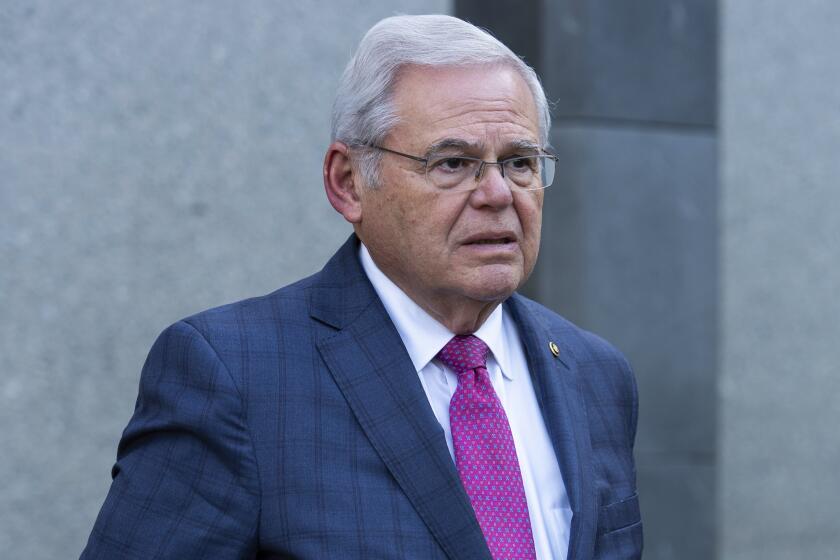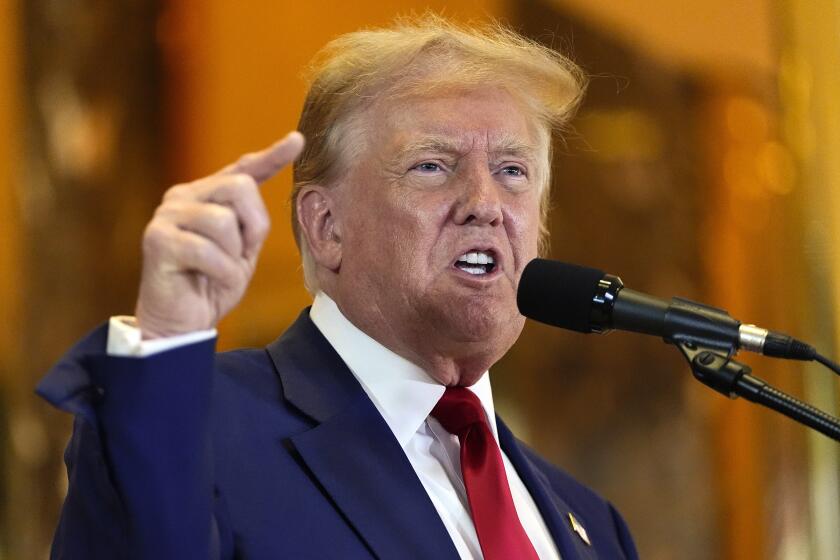GOP Pushes Savings Option in Medicare Plan
The emerging Republican plan to overhaul Medicare will allow all Americans, not just the elderly, to set up tax-exempt savings accounts to buy health insurance and pay for uncovered medical services, GOP leaders said Tuesday.
Their disclosure ignited an immediate firestorm of criticism from Democrats, who derided medical savings accounts (called MSAs) as another Republican gimmick that favors haves over have-nots and said that such accounts would adversely affect the nation’s deteriorating medical insurance financing system.
MSA proponents, however, said that the market-oriented approach would give consumers a freer hand in choosing their own coverage, generate insurance competition and drive down overall health spending by instilling greater cost-awareness among buyers. The plan would be an alternative to Medicare and those who wish to stay in the current system would be allowed to do so.
Key details of the GOP plan have yet to be worked out. But the essential concept of MSAs--long championed by conservatives and by most leading Republicans in Congress--is clear:
Participants would obtain a high-deductible catastrophic insurance plan, coupled with a medical savings account. The insurance policy would cover expenses exceeding an annual deductible of about $3,000. Participants would use funds in the savings account to cover co-payments or such items as prescription drugs or supplemental “Medigap” insurance that cover out-of-pocket expenses.
If money remains at the end of the year, the account holder would keep it, subject perhaps only to the income tax. The funds also could be accumulated to eventually pay for high-cost items, such as long-term care, officials said.
Under the GOP plan, a Medicare beneficiary wishing to create a medical savings account would designate a private catastrophic insurer to receive a federal payment on his behalf--presumably about the same amount that Washington now spends annually on each Medicare recipient, or roughly $4,900. The insurer then would use part of the payment, perhaps $2,100, to set up an MSA for the individual.
The MSA proposal would work in the same manner for those with workplace-based health insurance, except that their employers and not Uncle Sam would be the source of most, if not all, of the MSA funds.
Among those who briefed the media on Tuesday were House Majority Leader Dick Armey (R-Tex.) and House Majority Whip Tom Delay (R-Tex.). In the Senate, a similar plan has been drafted by Sen. Judd Gregg (R-N.H.). As Republican leaders touted their MSA proposal on Tuesday, they came under increasing Democratic pressure to provide details of their total Medicare reform package, which they say will ensure the solvency of the federal health insurance program for the elderly, in part by saving $270 billion over seven years through slowing the program’s rate of growth.
The GOP intends to enact the Medicare reforms as a part of the annual budgeting process but, with a new fiscal year barely more than two weeks away, time is running short--a point repeatedly emphasized by Democrats on Tuesday.
“Never has the United States Congress made a decision that affects as many people, affects so much money [and] in such a short period of time as we are about to do--yet with so little information,” fumed Rep. Sam Gibbons of Florida, the ranking Democrat on the House Ways and Means Committee.
On the Hill, Democrats also renewed charges that Republicans want to cut Medicare spending to provide $245 billion in tax cuts--a line of attack that Democrats clearly hope will derail both the tax cuts and the Medicare overhaul.
Keenly aware of their potential vulnerabilities if the Democrats succeed in linking the two actions, GOP leaders have called a rare meeting of all Republicans in Congress for Thursday to discuss how to handle the issue.
“We have to have the Senate and House singing from the same hymnal. We’re all in this together,” said Senate Majority Leader Bob Dole (R-Kan.).
On Friday, House Speaker Newt Gingrich (R-Ga.) is to be joined by Ross Perot, the 1992 independent presidential candidate, for a town hall meeting on Medicare at the U.S. Chamber of Commerce here.
The Republicans had planned to release their long-awaited Medicare plan before the end of the week, but Armey said Tuesday that “the rollout” may be delayed until Monday. He did not elaborate.
Armey also said that the MSA proposal demonstrates that Republicans prefer to “trust people to manage their own money” rather than letting Washington dictate such personal decisions as selecting health insurance.
But Rep. Henry A. Waxman (D-Los Angeles), a leading Democratic authority on Medicare, said that medical savings accounts would hand millions of Americans thousands of dollars a year that they do not need--while depleting program funds available for the sickest Medicare recipients.
Noting that about 70% of all Medicare outlays are spent by only 10% of the Medicare population, the former chairman of the House Energy and Commerce subcommittee on health and the environment, said:
“If you take the average amount that will be spent on everyone . . . and then give people cash equivalents to that amount and say: ‘Go put it into a medical savings account,’ you’re going to be giving a lot of people money who don’t need it. . . . And for those who are really sick, they’re going to stay in the program and that’s going be a very expensive program because we’ve segmented the market.”
Rep. Pete Stark (D-Hayward), former chairman of the House Ways and Means health subcommittee, argued that MSAs--by allowing participants to keep unspent funds--would deter people from seeking preventive care, which can avert more serious and costlier health problems.
Times staff writers Janet Hook and Doyle McManus contributed to this story.
More to Read
More to Read
More to Read
Get the L.A. Times Politics newsletter
Deeply reported insights into legislation, politics and policy from Sacramento, Washington and beyond. In your inbox three times per week.
You may occasionally receive promotional content from the Los Angeles Times.






